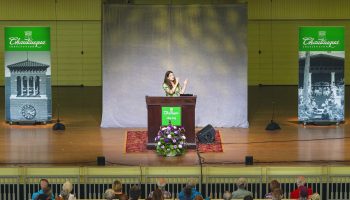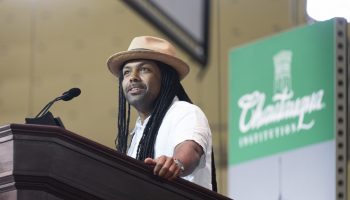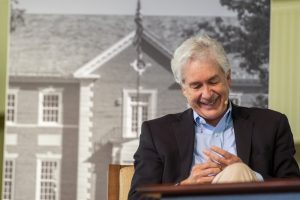
Serving five presidents and 10 secretaries of state, William J. Burns has played a vital role in over three decades of international politics.
Drawing from that experience, along with his new book, The Back Channel: A Memoir of American Diplomacy and the Case for Its Renewal, Burns outlined the best of American diplomacy in some of the country’s darkest hours.
Burns, president of the Carnegie Endowment for International Peace and former deputy secretary of state, spoke in conversation with Chautauqua Institution President Michael E. Hill Friday in the Amphitheater, concluding Week One’s theme “Moments That Changed the World.”
Hill chose three events outlined in his book: the Cold War; 9/11; and Iran — from the 1970 hostage crisis to the present day.
Just as he did in his lecture, Burns opens his book with a scene of Arabs and Israelis gathered together at the 1991 Madrid Peace Conference at the end of the Cold War. Burns said that was a moment he saw “American diplomacy and power at their peak.”
“The end of the Cold War in the late 1980s, 1990s; we saw a moment in which the United States was the singular, dominant player in the international landscape, not just with the end of the Cold War, but then with the collapse of the Soviet Union,” Burns said.
Burns referred to the end of the Cold War as a “plastic moment” in the history of the international landscape — the kind that only comes along once or twice a century. At the time, he was a young diplomat in the George H.W. Bush administration working for Secretary of State James Baker.
However, it was not the rarity of the event that was striking to him. Instead, it was the intersection of the moment of “profound transformation” with a group of American statesmen who were “particularly impressive” in the ways they helped the United States navigate the end of the Cold War.
The first way was with a sense of “strategic purpose.”
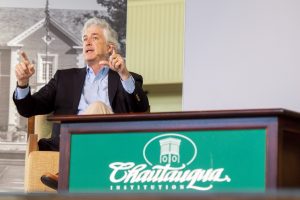
“I think Bush and Baker understood that this moment was not going to last forever,” he said. “They saw an opportunity to use that moment of singular American dominance in the landscape, with no real major power rivals at that moment, to try to shape an international order which would serve our interests and serve our values long after that moment of dominance ended, as inevitably it would.”
The second way was a sense of “strategic empathy,” which Burns said is very different from “strategic sympathy.”
“What I mean by that is they understood the predicament of Mikhail Gorbachev, the leader of the Soviet Union, as his country was collapsing all around him,” he said. “There is always a temptation to rub in those moments, but you didn’t see Bush and Baker dancing on the Berlin Wall at the end of the Cold War.”
The third way was with discipline. Burns recalled the moment in 1991, when Bush, who had expelled Saddam Hussein’s Iraqi forces from Kuwait, chose not to try to overthrow Hussein’s regime.
“I remember Baker saying at that time that sometimes the hardest thing to do in diplomacy might seem to be the easiest: It’s not to do something,” he said. “I think Bush and Baker understood that had they pursued Iraqi forces all the way to Baghdad and brought about forcible regime change, it would have fractured the international coalition.”
There was also a sense of optimism at the end of the Cold War where it seemed Russia could become a democratic state, according to Burns. Hill asked Burns where he saw that possibility flip.
“There was big debate in the late 1990s in Washington — the usual kind of self-absorbed debate in Washington — about who lost Russia,” Burns said. “I always thought that was the wrong question. Russia was never ours to lose. Russia at the end of the Cold War, after the collapse of the Soviet Union, had lost faith in itself. Russians had lost faith in themselves.”
Burns said understanding what Russia went through in the 1990s is an important part of understanding Vladimir Putin’s Russia now.
“He carries himself with a great sense of self assurance” – Burns on President Putin.
— The Chautauquan Daily (@chqdaily) June 28, 2019
“In a sense, Putin himself is an apostle of payback,” he said. “His conviction, and I am not trying to justify this, is that the West, and especially the United States, took advantage of Russia’s moment of historical weakness in the 1990s.”
Burns said Putin is a “combustible combination” of grievance, ambition and insecurity and although he is not intimidating in the flesh, he carries himself with a “great deal of self-assurance.”
Burns recalled a meeting where Putin told him Russia and America could have effective relations, but they can no longer only be on America’s terms.
“In my experience, that was vintage Vladimir Putin,” Burns said. “It’s not subtle, it’s defyingly charmless, but it is born of a determination to push back against people, whether it is Americans or other people who he thinks are trying to take advantage of the relatively weaker hand that Russia still has to play today.”
According to Burns, Putin leaves a small set of possibilities for how to “deal with Russia,” but he doesn’t think America should give up in trying to do so.
“As important as I think it is not to give in to Putin’s aggressiveness, it’s almost as important, I think, for Americans not to give up on the Russia beyond Putin,” he said. “There is a middle class in Russia today which chafes at the corruption they see all around them.”
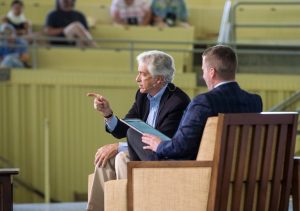
The country with the weak hand to play switched with the 2016 presidential election, Burns said; at that moment, Putin took advantage of America’s “fragile state.”
“When Putin, in our election in 2016, saw dysfunction and polarization, he saw an opportunity to take advantage of our weaknesses, most of them self-inflicted,” Burns said. “He didn’t hesitate, he wasn’t shy about trying to do that, and — at relatively low cost to him — to hire several hundred cyber hackers. He was able to not only sow further chaos, but take advantage of the chaos of our political system.”
Hill shifted the conversation to Sept. 11, 2001, asking Burns how that day altered American foreign policy. Burns was working in the U.S. Department of State at the time.
“9/11, as all of us recall, was a huge shock to our system,” he said. “The terrible al-Qaeda attack on our homeland, it was bound to jolt the way in which (America) saw the world. It created a sense of mission to try to ensure that the United States would never again be vulnerable to that kind of attack. It put the burden on prevention, not preemption.”
In response to the attack, Burns said “neoconservatives” had an “extraordinarily ambitious” plan to push out the Taliban regime.
“It was the notion that by overthrowing Saddam, by demonstrating American power in accomplishing that, that you could plant the seeds of democracy in the Arab world, that you could shift the balance in the Middle East,” he said.
There was another, less ambitious, approach following the attack that Burns said was led by “paleoconservatives.”
“It wasn’t so ambitious in the sense of what overthrowing Saddam could accomplish,” he said. “It was born of a much more basic view that American power is best served unilaterally, that to overthrow the Taliban in Afghanistan was necessary, but not sufficient to send a message that nobody should think about not only harboring terrorists, but anything like the attack that we suffered on 9/11.”
When Burns ran the Bureau of Near Eastern Affairs, he and his colleagues were “deeply concerned” about the consequences the day after Hussein was overthrown. Burns said he held his “most depressing” brainstorming session in an attempt to lay out all of the things he thought could go wrong. He finished with a 14-page, single-spaced, list called “The Perfect Storm.”
“… I think the hard part was how do you deal with Iraq after Saddam Hussein?”
— The Chautauquan Daily (@chqdaily) June 28, 2019
“I mention it only because it was an honest effort to express our concerns, even though they were inconvenient to the leadership in the White House and other parts of the federal government at the time,” he said.
Even now, Burns is unsure if he should have done more.
“I have enormous respect for colleagues of mine who have resigned from a career in public service because they couldn’t, in their conscience, follow a policy that they thought was deeply flawed,” he said. “I think there can be a sense of honor, and certainly discipline, in staying in a system, but with that comes an obligation: an obligation to be honest even when it’s inconvenient.”
The next historical moment Hill asked about was the Arab Spring, specifically why that region makes it hard to have a “positive approach to democracy.”
“The Middle East is strangely addictive in American foreign policy,” Burns said. “I think President Barack Obama was right to understand that at this moment on the international landscape, with the rise of China, and as Asia in many ways increasingly becomes the center of gravity, it made sense for us, not so much to disengage in the Middle East, but to change the terms of engaging.”
America’s record on the Arab Spring, from 2011 on, was “quite mixed,” Burns said.
“You have to understand the limits of American agency,” Burns said. “A lot of our friends in the Gulf — the Saudis and others — bitterly criticized President Obama, to this day, for throwing President Hosni Mubarak under the bus. The truth, in my experience, is the bus was halfway across his political body before President Obama pronounced himself on whether Egypt needed change or not.”
In the end, Burns said America “played its hand” in Egypt as well as it could have.
“We made some tactical mistakes, but I think — broadly speaking — it was beyond our power,” he said.
“President Trump’s views on diplomacy tend to be narcissistic.”
— The Chautauquan Daily (@chqdaily) June 28, 2019
Burns also worked with Libya during the uprising in Benghazi and said he believes it would have been hard for any president to resist intervention. But regardless of making the decision to overthrow Colonel Muammar Gadhafi, Burns said America underestimated the difficulty of maintaining order in post-Gaddafi Libya.
“That then led to the awful attack of our diplomats when four of my colleagues were killed in Benghazi in September of 2012,” he said.
Burns was on a trip in Baghdad when the attack occurred and flew back to accompany his colleagues’ remains to the Joint Base Andrews air base.
“It was the loneliest, saddest flight I have ever been a part of,” he said. “I am sitting in this C-17 aircraft with four coffins with a U.S. flag on them for 10 hours. Flying back, with not much else to do besides reflect on that tragedy in both human and national terms, and on the reality that there is no such thing as ‘zero risk’ for diplomats.”
Hill then directed the conversation to Burns’ role as a negotiator in Iran’s nuclear deal in 2015.
Burns described the relationship between Iran and the United States as a “minefield that no one had a map for.”
With the Iran hostage crisis in 1979 and the bombing of a U.S. Marine barracks in Beirut in 1983, Burns said he saw the threat the Iranian regime posed.
“We needed to test the preposition that diplomacy backed up by military and economic leverage could actually limit the Iranian ability to threaten us,” he said, “in particular, to limit what was emerging as the most imminent risk, which was an unconstrained Iranian nuclear program which they had been gradually building, which had the potential, at least, to produce a nuclear weapon.”
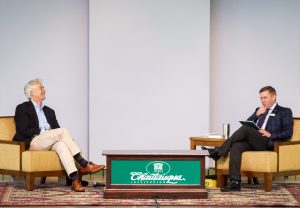
In response, Obama spent “most of his time” in his first term building leverage and creating an international coalition, Burns said.
“I have always believed that if you want to multiply your influence in the world, and especially strengthen the impact of economic sanctions, it’s best if you do that with a wide variety of countries,” he said.
By the beginning of Obama’s second term, Iran’s leadership was focused on halting the negative effects of the international sanctions. Because of that focus, Burns said America made enough progress to create a comprehensive nuclear agreement.
“It is not a perfect agreement, but perfect is rarely on the menu in diplomacy,” he said. “It was, I was convinced then and I am convinced to this day, the best of the available alternatives for preventing Iran from developing a nuclear weapon.”
To conclude his discussion of moments in the past, Hill asked Burns to look to modern-day America. Although Burns considers himself an optimist about the United States, he is worried about the current state of foreign affairs.
“I worry we are digging a hole for ourselves today at a moment when the landscape is in the midst of profound transformation,” Burns said. “We have the return of major power competition with China’s rise; the resurgence of Russia. We are no longer the only big kid on the geopolitical block, as we were for the first 20 years at the end of the Cold War.”
Burns said Washington has not taken the current power struggle as seriously as it should.
“We often tell ourselves that smart foreign policy begins at home in a strong political and economic system — of course that’s true,” he said. “But we have to do a better job of explaining to our own citizens that smart foreign policy ends at home, too.”
Looking toward the future, Burns has three main concerns: climate change, the revolution of technology, and tension between countries — particularly with the rise of China.
“I do not underestimate for a moment the intensity of the competition that China can pose for the United States,” he said. “I think the challenge for us is not so much to try to block China’s rise, which is a phenomenon that is going to be unfolding over the next couple of decades. The challenge is really how you shape the environment into which China rises. There are things within our grasp that we can do.”
“I do worry about climate change… I think we are missing an opportunity to deal with the revolution surrounding technology… I do not underestimate for a moment the intensity of competition China could pose on the United States…” – Burns’ closing remarks
— The Chautauquan Daily (@chqdaily) June 28, 2019

